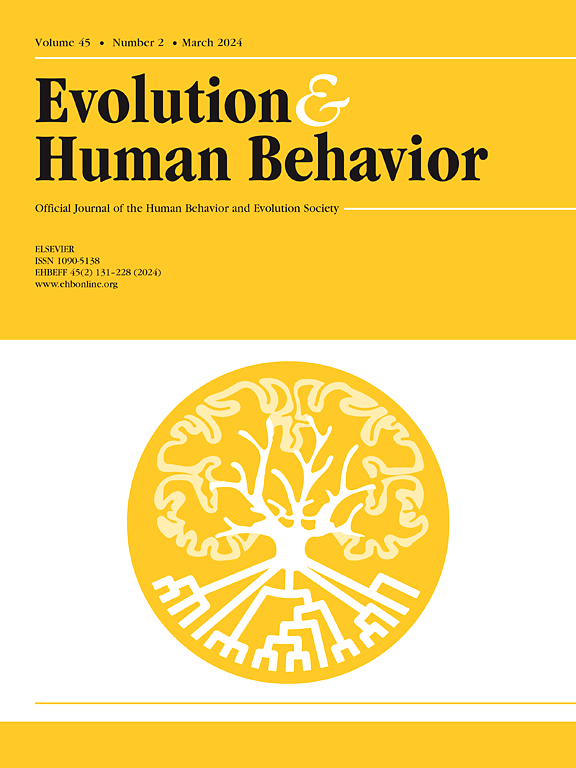The shared genome constraint: why between-sex genetic correlation matters for evolutionary social science
IF 3.2
1区 心理学
Q1 BEHAVIORAL SCIENCES
引用次数: 0
Abstract
Evolutionary social scientists propose adaptationist hypotheses that contribute significantly to our understanding of human traits. However, relatively little attention has been given to the constraints imposed by the largely shared genome of males and females, which results in substantial positive between-sex genetic correlations (rMF) for many complex traits. This oversight can lead researchers to propose sex-specific adaptive functions for traits that may instead persist in one sex primarily as a correlated genetic response to selection acting on the other (i.e., indirect selection via rMF). I briefly review the quantitative genetics literature underlying the logic of correlated responses, before turning to the implications of large and positive rMF for evolutionary hypothesizing in the social sciences. The implications are explored using human behavioral traits where rMF is likely high but remains unmeasured (paternal care, male choosiness, female aggression), as well as traits for which rMF has been estimated and found to range from high to low (risk taking, same-sex sexual behavior, extra-pair mating). I present genetic signatures for distinguishing between sex-specific selection and correlated responses to selection on the opposite sex and conclude by advocating for explicit consideration of high positive rMF and correlated responses in evolutionary social science, recommending that researchers state their assumptions about rMF.
共享的基因组约束:为什么两性之间的遗传相关性对进化社会科学很重要
进化社会科学家提出的适应主义假说对我们理解人类特征有重大贡献。然而,相对较少的关注是由于男性和女性大部分共享基因组所施加的限制,这导致许多复杂性状的大量正性别遗传相关(rMF)。这种疏忽可能导致研究人员提出性别特异性的适应功能,这些特征可能主要是作为对另一种性别的选择(即通过rMF进行的间接选择)的相关遗传反应而存在于一种性别中。我简要回顾了相关反应逻辑的数量遗传学文献,然后转向社会科学中进化假设的大而积极的rMF的含义。研究人员利用rMF可能很高但仍无法测量的人类行为特征(父系关怀、男性挑剔、女性攻击),以及rMF已被估计并发现范围从高到低的特征(冒险、同性性行为、额外配对交配)来探索其含义。我提出了区分性别特异性选择和对异性选择的相关反应的遗传特征,并主张在进化社会科学中明确考虑高正rMF和相关反应,建议研究人员陈述他们对rMF的假设。
本文章由计算机程序翻译,如有差异,请以英文原文为准。
求助全文
约1分钟内获得全文
求助全文
来源期刊

Evolution and Human Behavior
生物-行为科学
CiteScore
8.30
自引率
9.80%
发文量
62
审稿时长
82 days
期刊介绍:
Evolution and Human Behavior is an interdisciplinary journal, presenting research reports and theory in which evolutionary perspectives are brought to bear on the study of human behavior. It is primarily a scientific journal, but submissions from scholars in the humanities are also encouraged. Papers reporting on theoretical and empirical work on other species will be welcome if their relevance to the human animal is apparent.
 求助内容:
求助内容: 应助结果提醒方式:
应助结果提醒方式:


